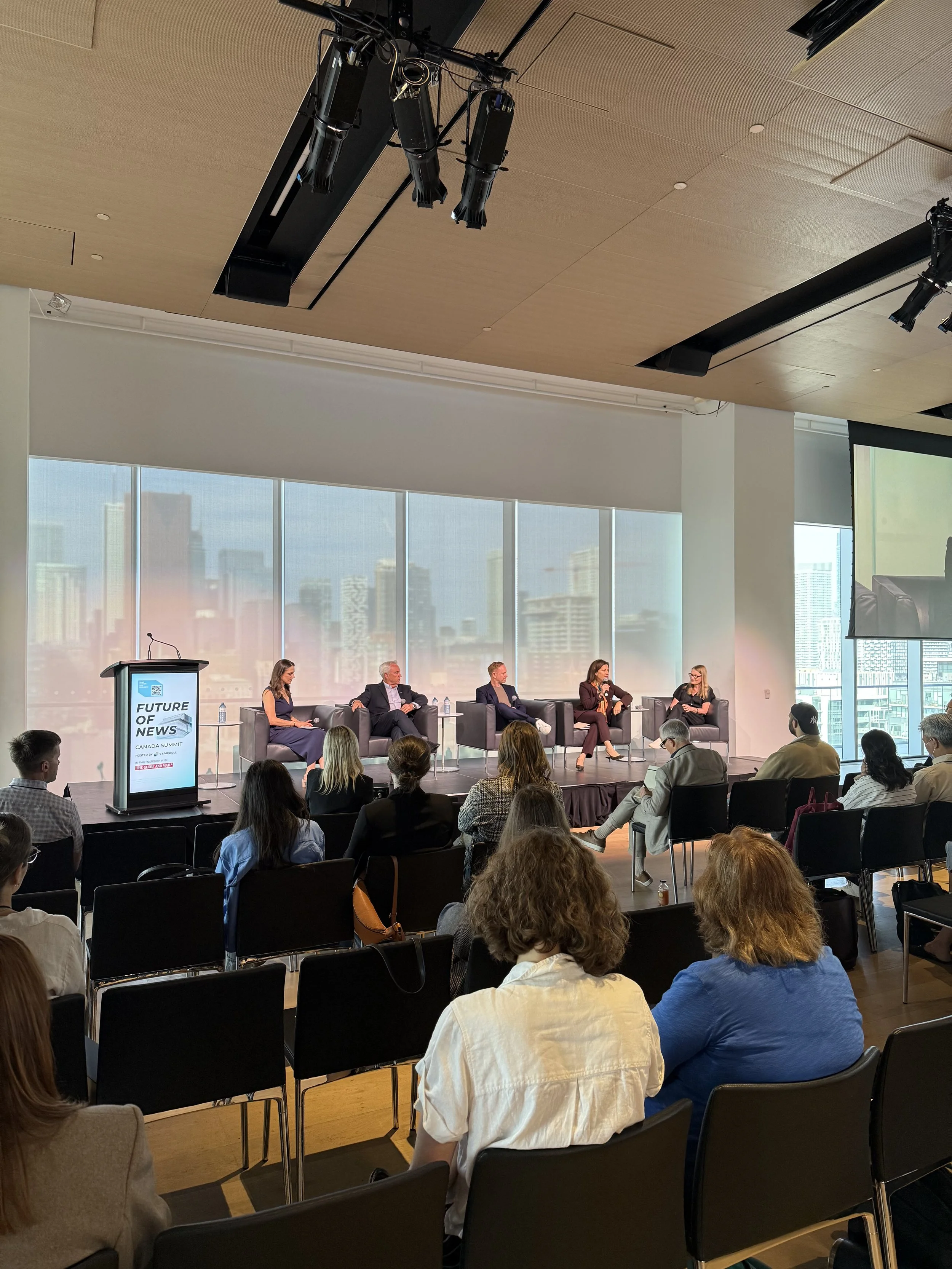Credibility, AI, and Brand Trust: PR Lessons from the Future of News Summit
Last week, we attended the Future of News Canada Summit in Toronto, an inaugural event hosted by Stagwell and The Globe and Mail. The conference brought together journalists and industry leaders to discuss the state of Canadian media.
It featured a discussion between David Walmsley, Editor in Chief of the Globe and Mail, and Rachel Pulfer, President of Journalists for Human Rights. There were also speakers from CNN, CIBC, Brunico and the Canadian Media Director's Council.
With recent research indicating that 71% of the Canadian population follow news closely, and 22% considering themselves ‘news junkies’, it reinforces that news media is far from dead and underscores the need for smarter earned media strategies that reflect where today’s media landscape is headed.
For PR practitioners, the conversations offered a clear roadmap for how to work smarter with news outlets, protect brand reputation, and prepare clients for the challenges ahead.
1. Credibility is king
Canadian newsrooms are facing real pressures. Shrinking budgets, the rise of disinformation, and social media echo chambers distort reality. Despite this, trust in established media remains strong and is a valuable asset for brands.
Now more than ever earned media should be viewed as a credibility engine, not just for publicity. Getting your message into reputable outlets shows audiences it has been vetted and verified, ultimately reinforcing trust with your brand.
We encourage our clients to engage media partners not just for earned, but through co-sponsored events and for paid content and amplification, so that we can leverage the trust and credibility they’ve built with their audience.
2. Brand safety requires cross-functional strategy
Avoiding traditional media and hard news doesn’t protect brands. If anything, that risk assessment is wrong. Ad placements on unmoderated platforms actually carry greater risk, appearing alongside harmful content or even foreign propaganda.
CIBC shared how they approach reputation holistically: aligning PR, marketing, sponsorship, and public affairs teams through weekly meetings and line of sight into KPIs. PR counsellors can help clients adopt this integrated approach so earned, owned, and paid channels complement each other. The result is a stronger, more resilient brand reputation.
Brand reputation is also the reason we encourage collaboration between marketing, events and government relations teams. True cross-functionality will result in more integrated PR campaigns with consistent messaging across various platforms.
3. Stay ahead of AI risks
In a world where it’s increasingly tough to know what’s real, journalism is one of the only remaining sources for credible information–including speaking accurately about a brand.
However, during the panel, Shannon Lewis, president of the Canadian Media Directors Council touched on how AI-generated news sites have jumped from 43 in 2023 to more than 1,500 today, dramatically increasing the risk for false or misleading information.
Now more than ever, it’s crucial that PR teams monitor for AI-driven misinformation and correct the record quickly. This also means agencies being at the forefront of AI innovationAI so we can act in partnerships with brands on preferred tools and responsible usage to ultimately mitigate reputational risks.
At the same time, the overuse of AI alone in writing can damage credibility extensively. The Globe and Mail shared, their editorial teams are already flagging op-eds written entirely by AI. With this in mind, it’s important to be conscious of using AI as a starting point for research and drafts, while keeping strategy, tone and voice human. AI should be embraced as a tool to enhance our storytelling, without losing the quality and integrity that the human touch brings to the work we do.
4. Purpose builds long-term brand connection
Even with the increasing emergence of AI, purpose hasn’t gone away. Younger audiences want to see brands supporting society. They understand that journalism plays an important role in a healthy democracy, and they notice when companies back credible media and share trustworthy information. In fact, a recent Ipsos poll found that 87% of Canadians believe local news is important to a well-functioning democracy.
The take away for communications teams is as true today as 10 years ago. Aligning with trusted media outlets, supporting local journalism, and designing campaigns that strengthen Canada’s information ecosystem builds community, connection and long-term brand affinity - something at the core of the work we do.





